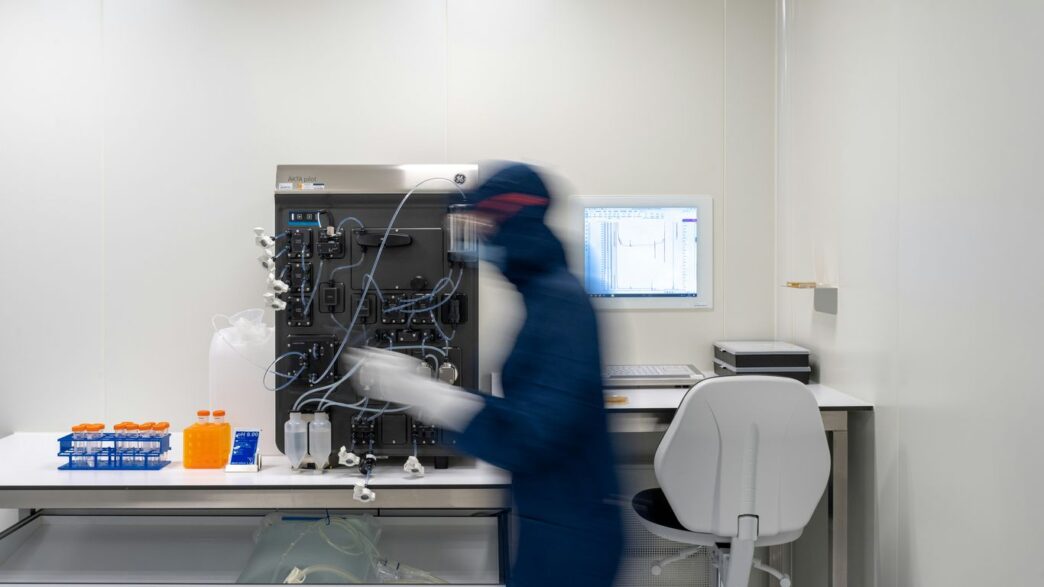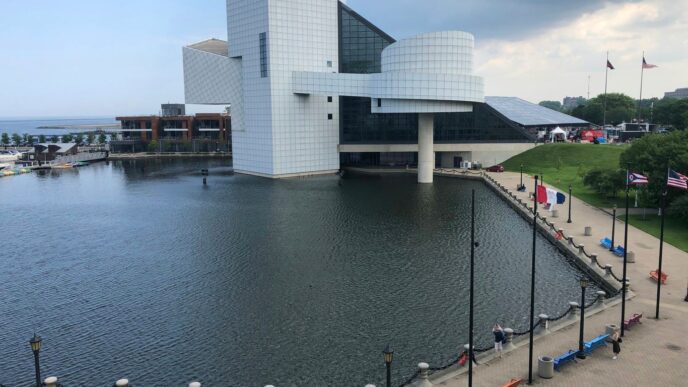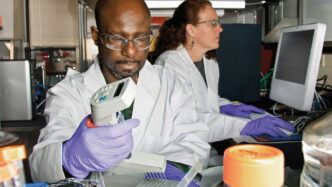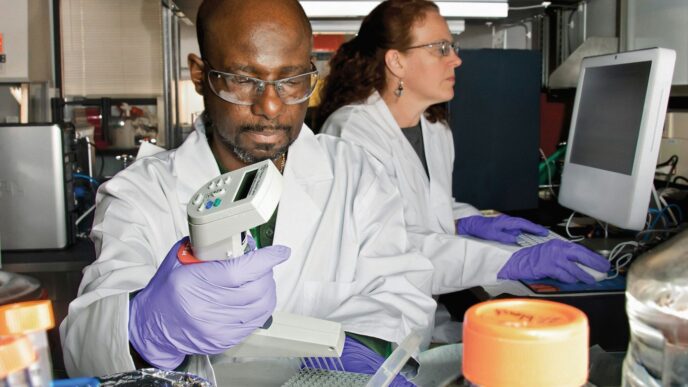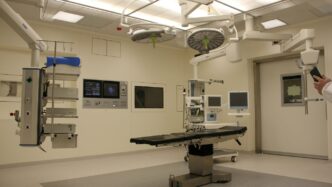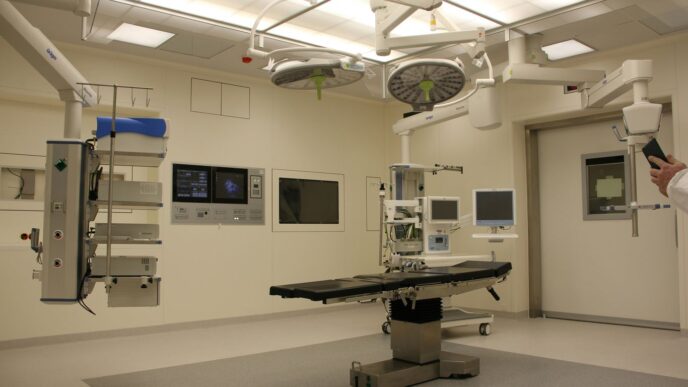Portland’s got this buzz going on, especially in the biotech world. It’s not just a place for coffee and rain anymore; it’s becoming a real hotspot for companies doing cool stuff with science and technology. We’re talking about everything from new medicines to ways to help the environment. It’s pretty interesting to see how this scene has grown, and there’s a lot happening that’s worth checking out if you’re curious about what’s next in health and science.
Key Takeaways
- Oregon’s bioscience industry is a significant economic driver, creating billions in economic output and offering well-paying jobs, with a notable portion of these opportunities located outside the immediate Portland metro area.
- Portland’s startup ecosystem is active, with companies focusing on areas like climate tech, travel, and edtech, supported by local accelerators and investment groups.
- Securing funding is a key focus for startups, with options ranging from angel investors and venture capital to grants and bootstrapping strategies available within the region.
- A strong support network exists for entrepreneurs, including mentorship programs, incubators, accelerators, and community events designed to help new businesses grow.
- Workforce development is a priority, with initiatives like educational pathways and interactive tools aimed at attracting and retaining talent in the life sciences sector.
Portland’s Thriving Biotech Ecosystem
Portland’s biotech scene is really picking up steam, and it’s more than just a few companies doing interesting work. It’s a whole ecosystem that’s growing, with a lot of different pieces fitting together. Think of it as a place where new ideas are born, companies are growing, and there’s a real sense of community driving it all forward. The state of Oregon, and Portland in particular, is becoming a notable spot for life sciences.
Oregon’s Bioscience Industry: A Snapshot
Oregon’s bioscience industry is quite diverse, covering everything from healthcare and agriculture to environmental tech. It’s not just concentrated in one area either; you’ll find life science businesses spread across the state. This broad reach means opportunities exist in many different counties, not just the big metro areas. The state offers a good mix of affordability and a pleasant climate, which helps attract people and companies looking to make their mark in this field.
Here’s a quick look at the numbers:
- Total Economic Output: $15.7 billion generated by life science establishments and research.
- Private Life Science Establishments: 1,480 companies directly contributing $7.6 billion.
- Jobs in Private Life Science: 16,820 workers earning $1.5 billion in wages.
- Average Annual Wage: $88,440, which is about 50% higher than the average private sector wage in the state.
- Growth Since 2002: Private life science employment has seen an 85% increase, adding over 5,000 jobs.
Economic Impact and Job Growth
The bioscience sector is a significant contributor to Oregon’s economy. It’s not just about the direct jobs created within the companies themselves, but also the ripple effect throughout the broader economy. The wages earned by those working in life sciences are generally higher than the state average, meaning more disposable income circulating locally. This economic activity supports other businesses and services, creating a positive cycle of growth. The industry has shown consistent job growth over the years, indicating a healthy and expanding sector.
Innovation Beyond the Portland Metro Area
While Portland gets a lot of attention, it’s important to remember that the bioscience industry isn’t limited to the city. Many smaller towns and rural areas across Oregon have life science companies and research facilities. This statewide presence means that innovation is happening everywhere, not just in one central hub. It also provides diverse opportunities for people living outside the immediate Portland area, contributing to economic development across the entire state. This distributed growth helps build a more resilient and widespread bioscience community.
Key Players in Portland’s Biotech Scene
Portland’s biotech scene is a dynamic mix of fresh ideas and solid foundations. It’s not just about one or two big names; it’s a whole ecosystem buzzing with activity. We’re seeing a real surge in companies tackling everything from new medical treatments to environmental solutions. It’s pretty exciting to watch.
Startups Driving Innovation
Portland has a bunch of startups that are really pushing the envelope. These are the companies that are often the first to try out new technologies or approaches. They’re not afraid to take risks, and that’s how big breakthroughs happen.
Some of the names you’ll hear a lot about include:
- Enduring Planet: They’re focused on climate innovation, which is a huge deal right now. Think about how much we need solutions for environmental challenges.
- TrovaTrip: This company is making waves in the travel tech space, connecting creators with unique travel experiences. It’s a different kind of innovation, but still important.
- ConductorOne: They’re working on cybersecurity, specifically with automated access. In today’s digital world, that’s pretty critical.
- Keliomics: This startup is looking at transforming cancer treatment technologies. It’s the kind of work that could genuinely change lives.
- PreAct Technologies: They’re developing new ways to improve automotive safety, focusing on collision avoidance. Making our roads safer is always a good thing.
These companies, and many others like them, are the lifeblood of Portland’s innovative spirit. They’re often the ones attracting early-stage investment and bringing new energy to the market.
Established Companies and Research Institutions
It’s not all about the new kids on the block, though. Portland also has some established players and important research institutions that provide stability and a strong base for the entire biotech community. These organizations often have the resources and experience to take promising ideas and scale them up.
Think about the big research universities and hospitals in the area. They’re not just educating the next generation of scientists and doctors; they’re also conducting groundbreaking research that can lead to new discoveries and spin-off companies. These institutions often partner with both startups and larger companies, creating a collaborative environment.
We also have larger, more established companies that have been in the region for a while. They might be involved in manufacturing, developing established medical devices, or providing critical services to the broader life sciences sector. Their presence provides jobs and a steady economic contribution.
Emerging Technologies in Focus
The biotech field is always changing, and Portland is keeping pace. Several emerging technologies are getting a lot of attention here:
- AI and Machine Learning: These tools are being applied across the board, from drug discovery and development to diagnostics and personalized medicine. It’s about making processes faster and more accurate.
- Gene Editing and Therapy: Advances in understanding and manipulating genes are opening up new possibilities for treating genetic diseases. This is a complex but incredibly promising area.
- Biomanufacturing: As more biotech products are developed, there’s a growing need for advanced manufacturing capabilities. Portland is looking to build up its capacity in this area to support the production of new therapies and diagnostics.
- Digital Health: This includes everything from wearable health trackers to telehealth platforms and AI-powered diagnostic tools. It’s about using technology to improve healthcare access and outcomes.
These are just a few examples, but they show the breadth of innovation happening. The focus is often on practical applications that can lead to real-world improvements in health and well-being.
Fueling Growth: Funding and Investment Opportunities
Getting the money needed to get a biotech company off the ground and keep it running can feel like a puzzle. It’s not just about having a great idea; it’s about finding the right people and programs to back that idea. Portland’s got a decent setup for this, with a few different ways for companies to get the cash they need. The trick is knowing where to look and what each option really offers.
Angel Investors and Venture Capital Networks
This is often the first place startups turn when they need a significant chunk of change. Angel investors are usually individuals with their own money who are willing to bet on early-stage companies. Venture capital (VC) firms, on the other hand, manage larger pools of money from various sources and typically invest in companies that show a lot of potential for rapid growth. In the Portland area, there are groups that actively look for promising biotech ventures. Some focus on specific types of innovation, like climate tech, while others have a broader interest. It’s about finding investors whose goals align with yours and who can bring more than just money to the table – think industry connections and strategic advice.
- Elevate Capital: Known for supporting entrepreneurs from underrepresented backgrounds.
- Oregon Venture Fund: Invests in local teams with big ambitions.
- Portland Seed Fund: A good starting point for companies in their early stages.
Grant Programs for Biotech Ventures
Grants are essentially free money – you don’t have to pay it back or give up equity. These are often offered by government agencies or foundations to support research and development, especially in areas that benefit public health or the environment. For biotech, this can be a huge help, particularly for the long, expensive research phases. Business Oregon has programs that can assist businesses, and if your work is in health tech or life sciences, OHSU Innovates might have specific funding opportunities. Sometimes, you might get awarded a grant but have to wait a while for the money to actually arrive. Companies like Enduring Planet are even stepping in to offer advances on grant funding, helping bridge those cash flow gaps.
Bootstrapping Strategies for Early-Stage Companies
Bootstrapping means growing your company using only your own resources – think revenue from early sales, personal savings, or loans from friends and family. It’s a slower path, for sure, and requires a lot of discipline. But it also means you keep full control of your company and don’t owe anyone a piece of it. Portland’s resourceful spirit fits well with this approach. It forces you to be really smart about spending and focus on what truly matters to get your product out there and start generating income. It’s not for everyone, but for some founders, it’s the most sensible way to start, especially if they want to avoid the pressure that comes with external investment.
Navigating the Landscape: Support and Resources
Starting a biotech company in Portland is exciting, but let’s be real, it can also feel like trying to find your way through a maze. Luckily, there’s a whole network of folks and places ready to help you out. You don’t have to go it alone.
Mentorship and Advisory Programs
Sometimes, you just need someone who’s been there, done that. Getting advice from experienced professionals can make a huge difference. Think of it like having a seasoned guide for your journey.
- Oregon Entrepreneurs Network (OEN): They have programs specifically designed to pair up-and-coming entrepreneurs with seasoned business leaders. It’s a great way to get practical advice.
- SCORE Portland: This group offers free, confidential mentoring from retired business executives. They cover all sorts of industries, so you can likely find someone with relevant experience.
- OHSU Innovates’ Entrepreneur-in-Residence Program: If your work is tied to healthcare or life sciences, this program connects you with experienced business folks who can offer one-on-one guidance.
Incubators and Accelerators for Biotech Startups
These places are like launchpads for new companies. They often provide office space, resources, and structured programs to help you grow quickly.
- StarveUps: This is one of Oregon’s first startup accelerators, focusing on helping early-stage companies get off the ground.
- Portland Incubator Experiment (PIE): While not exclusively biotech, PIE has a strong track record of supporting tech startups and can provide valuable connections and mentorship.
- Various University Programs: Universities like PSU and OHSU often have their own innovation centers or business accelerators that cater to student and faculty-led ventures, especially in the life sciences.
Networking and Community Engagement
Connecting with other people in the biotech scene is super important. You never know where your next collaborator, investor, or even employee might come from.
- Calagator: This is a community-run calendar that lists pretty much every tech event happening in the Portland metro area. It’s your go-to for finding meetups and conferences.
- TAO (Technology Association of Oregon): They host regular events and have programs like
Workforce Development and Education

Getting the right people into the biotech field is a big deal for Portland’s growth. It’s not just about finding scientists; there are tons of other jobs too, like in manufacturing, sales, and even tech support. The area is working hard to make sure there are clear paths for people to get into these roles and stick around.
Attracting and Retaining Talent
Portland’s biotech scene is trying to be a place where people want to build a career. This means not only offering good jobs but also making the city a nice place to live. Companies are looking at ways to offer competitive pay and benefits, which is pretty standard stuff. But they’re also thinking about company culture and opportunities for people to move up. It’s a competitive market, so keeping good people is just as important as finding them in the first place.
Educational Pathways in Life Sciences
There are a few ways folks can get the training they need. Local universities and colleges have programs in biology, chemistry, and related fields. But it’s not all about getting a four-year degree. Some programs are focusing on shorter training courses or certifications that can get people into jobs faster. For example, there’s a cool video game called ‘Rad Lab’ that’s being used to show young people what jobs are available in bioscience, even ones that don’t require a science degree. It covers things like how to work in a clean room or follow rules from places like the FDA. It’s a neat way to get people interested early on.
Interactive Tools for Career Exploration
Beyond the ‘Rad Lab’ game, there are other ways people can check out what biotech jobs are like. Some organizations are setting up workshops or online resources that let you try out different tasks. Think of it like a virtual job shadow. You can learn about what a day might look like for someone working on medical devices or in a lab. This helps people figure out if a particular career path is a good fit before they commit to a lot of training. It’s all about making informed choices.
| Career Area | Example Roles |
|---|---|
| Research & Development | Lab Technician, Research Scientist |
| Manufacturing | Production Operator, Quality Control Inspector |
| Sales & Marketing | Medical Device Sales Rep, Product Manager |
| Operations | Supply Chain Specialist, Regulatory Affairs Specialist |
The Future of Biotech in Portland
Emerging Trends and Future Outlook
Portland’s biotech scene is really picking up steam, and it’s not just about the big breakthroughs you see on the news. Think about it – we’ve got a growing number of startups focusing on things like climate tech and sustainable solutions, which feels very Portland, right? Companies are looking at how to make healthcare more accessible and how to develop new ways to tackle environmental challenges. The city’s unique blend of innovation and a focus on sustainability is a major draw for entrepreneurs. It’s not just about making money; it’s about making a difference.
Portland’s Unique Advantages for Biotech
So, what makes Portland stand out? For starters, it’s way more affordable than places like Silicon Valley, which means startups can stretch their funding further. Plus, the community here is pretty tight-knit. You’ve got resources like incubators and accelerators that are genuinely trying to help new companies get off the ground. It’s not just a place to work; it feels like a place to build something lasting.
Here are a few things that give Portland an edge:
- Affordability: Lower operating costs compared to major tech hubs.
- Community Support: A strong network of mentors, investors, and fellow entrepreneurs.
- Quality of Life: Access to nature, a vibrant culture, and a generally relaxed pace.
- Focus on Sustainability: A natural alignment with biotech companies developing eco-friendly solutions.
Contributing to Global Health and Sustainability
Looking ahead, Portland’s biotech companies are poised to make a real impact. We’re seeing a lot of work in areas that directly address global issues. Whether it’s developing new medical treatments, creating cleaner energy sources, or finding ways to make agriculture more sustainable, the innovation happening here has the potential to reach far beyond Oregon’s borders. It’s exciting to think about how these local efforts could contribute to solving some of the world’s biggest problems. The city’s commitment to a better future, combined with its growing biotech talent, sets a strong stage for what’s to come.
Portland’s Biotech Future Looks Bright
So, what’s the takeaway from all this? Portland’s biotech scene is really something special. It’s not just about the big companies, but also the smaller ones just getting started, all working together. The state is putting a lot of effort into making sure this industry keeps growing, and it shows. With all the research happening and new companies popping up, it feels like we’re on the edge of some pretty cool breakthroughs. It’s exciting to see how these businesses are not only creating jobs but also finding ways to help people and the planet. Portland is definitely a place to watch in the world of biotech.
Frequently Asked Questions
What makes Portland a good place for biotech companies?
Portland is a great spot for biotech because it has lots of smart people working in science and technology. The area has a strong history of creating new things, and there are many universities and research centers that help new ideas grow. Plus, the cost of living here is more affordable than in some other big tech cities, making it easier for companies and their employees to thrive.
How much money does the biotech industry bring to Oregon?
The biotech and life science industry is a big deal for Oregon’s economy! It creates billions of dollars in economic activity and supports thousands of jobs. Many of these jobs pay much better than the average job in the state, which is fantastic for the local economy.
Are there jobs in biotech outside of Portland?
Yes, absolutely! While Portland is a major hub, biotech companies and research are spread all across Oregon. This means there are job opportunities in many different counties, not just in the main city area. It’s great because it helps communities all over the state.
What kind of new technologies are being developed in Portland’s biotech scene?
Companies in Portland are working on all sorts of exciting new things! This includes developing better ways to treat diseases, creating smarter farming methods, and finding solutions for environmental problems using biology. Think new medicines, cleaner energy, and ways to protect our planet.
How do new biotech companies get started and find money in Portland?
Starting a new company can be tough, but Portland has a supportive system. There are groups that connect new businesses with people who have money to invest, like angel investors and venture capitalists. There are also programs that offer grants, which is like free money for research and development. Some companies even start by using their own savings, which is called bootstrapping.
Are there programs that help people learn about biotech careers?
Yes, there are! Organizations are working hard to introduce young people to careers in biotech. They use fun tools like video games that show what it’s like to work in a lab or a research facility. These programs also help people understand the education needed and the kinds of jobs available, making it easier to choose a path.


